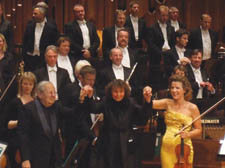|
|
 |
| |
| |
Truly powerful celebration of free movement
REVIEW: CHRONICLES
Barbican
FEATURING works by Sergey Prokofiev and Sofia Lubaidulina, Saturday evening’s concert of Russian symphonic and concerto music – part of the LSO’s Chronicle series at The Barbican – exhibited differing musical approaches used to override constrictions on personal and artistic freedom.
The performance commenced with Prokofiev’s Symphony No 5 in B Flat Major, Op 100. Written at the end of the Second World War, this four-movent symphony, attempts to articulate a desire for freedom on the part of the Russian people from both German occupation and internal Russian oppression.
Under the baton of Andre Previn, the LSO delivered a performance that was clear and controlled. Indeed, Previn’s masterly interpretation encapsulated the austerity of the time, never allowing the orchestra to bolt into the full bloom of optimism (a point that may not have appealed to traditionalists).
This slow and controlled build of the opening movement, coupled with the dampened enthusiasm of the second movement, never allowed the audience to sense an imminent freedom for a repressed people.
Sofia Gubaidulina’s Violin Concerto No 2, In Tempus Praesens focuses on the individual’s quest for freedom from repression as opposed to Prokofiev’s collective quest for the same ideal.
Born in 1931, Sofia Gubaidulina’s life experience incorporated the rigours of Stalinism. A modernist composer with an ear for experimentation and improvisation, Gubainulina’s composition restructures the orchestra with the removal of the traditional violin section, offering a greater weight to cellos and violas and increasing the aural density of the horn and percussion sections.
In Tempus Praesens, depicting the repression of religious freedom under Stalin’s governance, featured as soloist, the ever youthful and supremely talented Anne-Sophie Mutter, to whom Ms Gubaidulina dedicated the concerto.
Mutter, playing well within her compass, interpreted the piece wonderfully.
While at times her playing was almost obedient and submissive, she periodically managed, almost mischeviously, to break from overwhelming structural conformity to offer glimpses of individual bursts for freedom that left the heart willing each note to take flight.
Towards the finale of the concerto, the powerful and oppressive combination of brass and percussion almost threatened to subsume the soloist’s stretch for freedom, until, at its climax, the piece achieved a spiritual ecstasy in its final notal gasp, fulfilling the wishes of a spellbound audience.
The final emotional lift was applied when Ms Mutter invited Ms Gubaidulina from the audience to take the final bow with herself, with Andre Previn and the Orchestra allowing the audience to bear witness to a brave and excellent composer. |
 |
|
 |
|
|
 |
|








